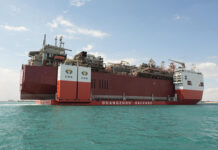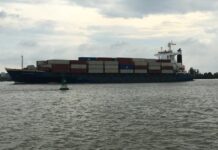
Commissioner of the US Federal Maritime Commission (FMC) Carl Bentzel has written to US President Joe Biden to ask for financial aid to staff and businesses that have been affected by the closure of the port of Baltimore following the Francis Scott Key bridge destruction.
In a letter seen by Container News, Bentzel thanked the president for his rapid response at the time of the accident, which effectively closed the Baltimore terminals to all maritime traffic, going in or out of the port of Baltimore from 26 March.
Three shallow channels have so far reopened but the FMC does not believe that the port will fully reopen to all vessels before the end of May.
As a consequence, Bentzel has asked President Biden to provide similar relief to the staff and businesses affected by the blockage of the Patapsco River that is preventing cargo from entering or leaving the port.
“During the pandemic, Congress passed the Coronavirus Aid, Relief, and Economic Security Act, commonly referred to as the CARES Act. Section 4112 of that legislation authorized and provided funding to the US Department of the Treasury to make payments to workforces devastated by the massive economic swings during the pandemic,” wrote Bentzel.
He added, “passenger air carriers, cargo air carriers, and certain contractors benefitted from the continuation of payment of employee wages, salaries, and benefits this statute provided. Collectively and over the course of the pandemic, more than US$66 billion dollars was provided to the aviation industry between 2020 and 2022.”
The collapse of the Francis Scott Key Bridge has seen local companies and workers “suffering from an economic upheaval”.
According to Bentzel, the CARES Act provides a ready-made model offering relief to those individuals and businesses impacted by the ongoing blockage of the port entrance.
“The maritime industry never stopped working during the pandemic. While other service industries, such as aviation, were forced to stay home during the height of the pandemic, it was maritime and intermodal services that kept delivering what turned out to be record setting cargo volumes,” noted Bentzel.
However, the latest catastrophe means that the maritime industry and community need help, thousands of employees in the Baltimore region are either directly or indirectly reliant on the port for their livelihood. “We should support them in their period of need to the same level as we did other transportation workers during the pandemic,” claimed Bentzel.
The FMC said it has not identified the cost of providing this relief but is trying to establish the process and the principle, which already has a precedent in the CARES Act.
“As for the longshoreman, it is mainly about making them whole while the terminals are down” said the FMC, while there are other businesses, trucking, warehousing and others that are also impacted by this situation.
Mary Ann Evans
Correspondent at Large





